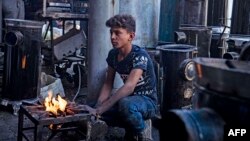Arab media outlets are reporting that Syria is undergoing a major crisis due to widespread fuel shortages across the country. The Syrian government no longer controls oil fields in the east of the country and U.S. economic sanctions continue to bite hard on the government's ability to import petroleum products from abroad via its Mediterranean coastline.
Protesters chanted slogans against the Syrian government over the weekend in the country's Druze heartland of Sweida to protest the widening fuel shortages and the country's worsening economic situation.
Syria's Prime Minister Hussein Arnous issued a statement last week announcing that one day would be lopped off the workweek for government workers for the rest of the month of December, "because of the situation facing the fuel sector due to a blockade and (U.S.) economic sanctions imposed on the country, in addition to the late arrival of oil and refined petroleum products (by sea)."
A man driving through the northern Syrian government-controlled city of Hama posted a video on social media showing the streets of that city almost devoid of vehicular traffic, other than a rare minibus. Government video of Damascus showed nearly empty streets with many people walking along the sides.
Supporters of the Syrian government posted satellite images of Iranian oil tankers that they claimed had arrived in the port city of Banias, which has a major government-operated refinery. Other opposition sources claimed that the U.S. Navy had stopped at least one of the tankers off the coast of Greece for a brief period. VOA could not independently confirm the claim.
Fuel shortages, coupled with a record low exchange rate for the Syrian pound against the U.S. dollar in trading Sunday, have combined to make life increasingly miserable for the average Syrian living in government-controlled parts of the country.
Widespread brownouts are also being reported due to the lack of fuel to operate power plants and private generators.
Economic bulletins on Syrian TV appear to avoid discussing the fuel crisis and the resulting economic meltdown, reporting instead on energy shortages and price increases in Europe. Many factories have reportedly shut down, according to reports on social media, and the Chinese press says that intercity football games and school sporting events have been canceled to save energy.
Paul Sullivan, a Washington-based political and energy analyst at the Atlantic Council, told VOA that "almost all Syrians are poor" these days, arguing that the "rapacious and cruel [President Bashar al-]Assad government is a failure at taking care of its people outside of a select few."
He noted that with the onset of winter, many Syrians now "burn pistachio shells, clothing and whatever they can find to keep a bit warmer." The life of the average Syrian, he said, "just keeps getting worse."
Sullivan pointed out that most of Syria's oil production comes from Kurdish-backed regions of the country, adding that "supplies out of there to the rest of the country are plummeting" for a variety of reasons, including the possibility that "oil fields are likely less productive … due to the low amount of investments in upkeep and exploration."
He also noted that "Turkish [air]strikes on the northeastern areas of Syria, where a lot of oil is produced and shipped, have also crippled some oil production and transport."




